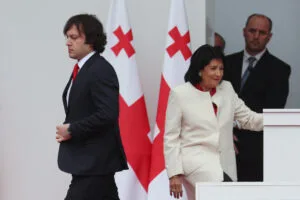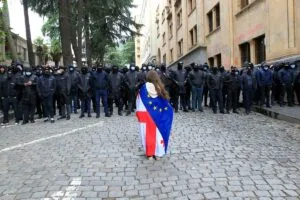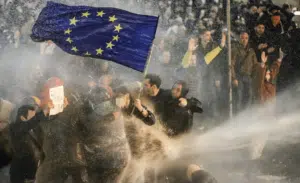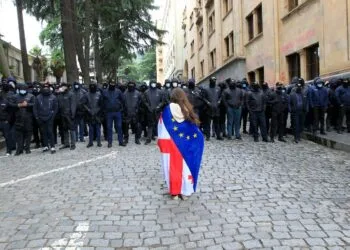Brussels – The answer to a pro-Russian law is a policy document to unite all pro-European and pro-Western parties ahead of the upcoming legislative elections on Oct. 26. Georgia’s president, Salomé Zourabichvili, has put herself at the head of the country’s democratic effort — prompted by tens of thousands of citizens who have been taking to the streets every day for two months to demand that the European future not be jeopardized — in explicit and stark opposition to the ruling Georgian Dream party, which yesterday (May 28) gave final approval to the law on ‘transparency of foreign influence’ overriding the Presidential veto placed at the end of the ordinary legislative process.

“I am proposing this plan to all political parties that aspire to be pro-European and pro-Western, urging them to decide by June 1 whether they accept the heavy responsibility of taking and implementing these steps before the Georgian people,” President Zourabichvili presented this way the Georgian Charter on the eve of the vote on the pro-Russian-inspired law, reiterated with all urgency last night ahead of its upcoming entry into force scheduled for June. A political “umbrella” under which parties opposing the Georgian Dream can present themselves “together or separately, as they choose” during the election campaign. “For my part, I will present this plan and the new political model to our partners in Brussels,” the head of state promised, recalling what is really at stake in October: “Restarting the EU accession process and opening accession negotiations as soon as possible,” over the empty words of Georgian Premier Irakli Kobakhidze, who pledged that “by 2030, Georgia will be ready for membership more than any other candidate country.”
The ‘Georgian Charter’ reflects not only “the needs and demands of society” but especially the commitment to execute and complete as soon as possible the nine priorities outlined by the European Commission for the start of EU accession negotiations. There are four steps, starting with the “abolition of laws harmful to the European course of the country.” Not only the Foreign Influence Transparency Law but also other pieces of legislation – such as the wiretapping law, the offshore law, and changes to the Electoral Law – and the politically motivated trials against the protesters of 2024. The Charter calls for the liberation of “the court from clan rule by verifying the integrity of judges and inspecting the origins of undocumented properties,” including through a reform of the Supreme Council of Justice and other essential organs of the state (Attorney General’s Office, Security Service, Anti-Corruption Agency, National Bank, regulatory bodies). Finally, it calls for “improving the electoral system,” creating the “appropriate conditions to hold free and fair elections.” The plan aims to fulfill the steps outlined “before the end of the very first spring session. all this into practice “first spring session” of the Parliament – with the government responsible for executing the action plan to be “appointed by the President of Georgia.” Upon completion of the steps, there will be snap elections in a “free and fair environment.”
The Foreign Agents Law in Georgia

After the first green light to the law (according to the ordinary legislative process) on May 14, a new, very rapid legislative process began to override the decision of the head of state, who has always strongly opposed a law that disturbingly echoes many elements of the same law in force in Russia. President Zourabichvili’s gesture was purely symbolic since the government knew from the outset that it could use its overwhelming majority in Parliament to override the veto and make ‘foreign influence transparency’ become law, as confirmed yesterday (May 28) from the plenary session of Parliament.
Despite receiving from the European Council candidate country status on December 14, 2023, in Brussels, it’s pretty clear that the entry into force of the pro-Russian-inspired law will prevent the opening of EU accession negotiations since these dep end on progress on European Commission recommendations on civil society freedom and combating disinformation. Despite the resistance of Viktor Orbán’s Hungary and Robert Fico’s Slovakia to endorse even a common position denouncing the move from the 27 Member States, the EU High Representative for Foreign Affairs and Security Policy, Josep Borrell, began working with the 27 governments on the “most appropriate response in case the law is implemented from June,” still urging the government led by Irakli Kobakhidze to “withdraw the law.”
Before the Foreign Agents Act

Despite being granted candidate status for EU membership, the relationship between Brussels and Tbilisi remains particularly complex – and now very tense – because of the divergence between an overwhelmingly pro-EU population and a government of pro-Russian tendencies, the same one that applied to join the Union over fears of expansionism by the Kremlin. Over the past two years, several episodes highlighted the ambiguity of the ruling Georgian Dream party. In May 2023, flights between Georgia and Russia resumed after Moscow decided to lift the ban, and the Caucasian country never aligned with restrictive measures introduced by Brussels against the Kremlin after it invaded Ukraine. Last fall, the government also attempted to impeach (but failed) the President of the Republic Zourabichvili for a series of trips to the European Union that allegedly constituted a violation of the powers of the state head of state under the national Constitution.
However, for years, the Georgian population has shown that it does not share the direction taken by the Georgian Dream, making the elections for the renewal of parliament on October 26 crucial. Around the time of Brussels’ decision in June 2022 not to grant Georgia candidate status for the time being, two major pro-EU demonstrations took place in Tbilisi: one ‘March for Europe’ to reiterate the people’s alignment with the values of the Union and a street call for the government’s resignation (with no follow-up by the then Garibashvili-led executive). The common features of these demonstrations are the flags – white and red of the five crosses (national) and with the twelve stars on a blue field (of the EU)-placards with pro-European claims and the Georgian anthem interspersed with the Ode to Joy. A year later, harsh mass protests broke out in March 2023 – supported by Brussels – which led to the momentary shelving of the controversial bill on ‘transparency of foreign influence’ until passing this spring in the midst of a new wave of mass protests.
In this scenario, one should not forget Georgia’s particularly complex relationship with Russia, a country with which it borders to the north. Its candidacy for EU and NATO membership – enshrined in its national constitution – has long been a cause of tension with the Kremlin. After conflicts in the 1990s with the two separatist regions of South Ossetia (1991-1992) and Abkhazia (1991-1993) following Georgia’s 1991 independence from the Soviet Union, on the ground, the situation was effectively frozen for 15 years, with troops of the newly formed Russian Federation defending the secessionists within the claimed territory. The attempt to reassert Tbilisi’s control over the two regions in the summer of 2008 – wanted by then-President Mikheil Saakashvili -led to a violent Russian reaction on August 7, not only in repelling the Georgian army’s offensive but also leading to the invasion of the rest of the national territory with tanks and air raids for five days. Since then, Vladimir Putin‘s Russia has recognized the independence of Abkhazia and South Ossetia and has deployed thousands of soldiers to the two territories to increase its sphere of influence in the Ciscaucasia region, in violation of the August 12, 2008 agreements.
English version by the Translation Service of Withub









